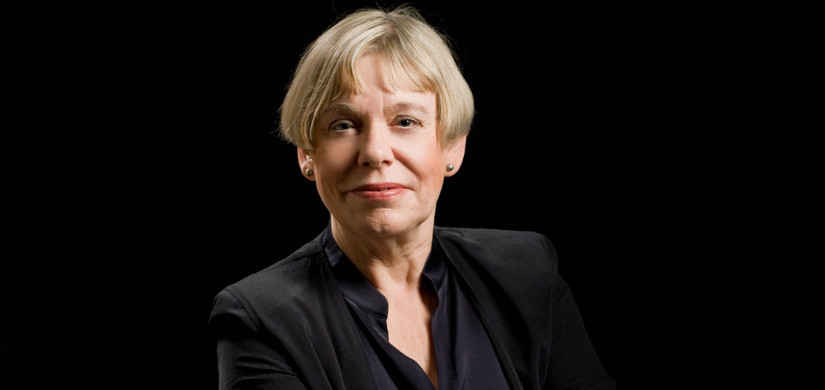You are in:
- Area of Communication and Media |
- Other News
Start of main content
Princess of Asturias Awards 05/31/2017
Karen Armstrong, Princess of Asturias Award for Social Sciences

©FPA
The Jury for the Award –convened by the Princess of Asturias Foundation– was chaired by Rafael Puyol Antolín and made up of Paz Battaner Arias, Sir John Elliott, Marta Elvira Rojo, Juan Pablo Fusi Aizpurúa, Isabel Gómez-Acebo y Duque de Estrada, Mauro Guillén Rodríguez, Óscar Loureda Lamas, Ricardo Martí Fluxá, Manuel Menéndez Menéndez, Sami Naïr, Joseph Pérez, Isaac Querub Caro, Gustavo Suárez Pertierra, Amelia Valcárcel y Bernaldo de Quirós, Fernando Vallespín Oña and Juan Vázquez García (as acting secretary).
This candidature was put forward by Pedro Miguel Echenique Landiríbar, 1998 Prince of Asturias Award for Technical and Scientific Research.
Karen Armstrong (Wildmoor, UK, 14th November 1944) entered the Catholic Convent of the Sisters of the Holy Child Jesus in 1962 and, as a novice, began her studies at St Anne’s College, Oxford. She left the order in 1969, subsequently earning a degree in Contemporary Literature. From 1973 to 1976, she lectured and carried out research at Bedford College, University of London, and from 1976 to 1981 taught English and was head of department at James Allen Girls’ School (Dulwich, South London). She published her first book in 1982 and a year later wrote and presented a documentary series on the life of St Paul for Channel 4 television, followed by three more. Since 1984, she has devoted herself mainly to writing about religion. She has taught Christianity at Leo Baeck College, a rabbinical college in London. Since 2005, she has been a member of the High Level Group of The Alliance of Civilizations, a UN initiative.
Karen Armstrong is considered a leading international scholar in the comparative study of Islam, Judaism and Christianity. Her first book was Through the Narrow Gate (1982), a memoir she continued in The Spiral Staircase (2004). The former was published in the Daily Express, at the same time as Armstrong began to appear on television programmes, one of which was Opinions on Channel Four, taking a polemic stand against the Catholic Church. In 1983, following the experience of her trip to Jerusalem to make the documentary about St Paul, she devoted herself completely to researching and studying religions, especially monotheistic religions. Her books A History of God: The 4,000-Year Quest of Judaism, Christianity and Islam (1993) and The Battle for God: Fundamentalism in Judaism, Christianity and Islam (2000) became bestsellers. She has also authored 20 other titles on faith, the major religions, the common elements among them, and the role they play in the modern world. Also worth highlighting among her works, which have been translated to numerous languages, are Holy War: The Crusades and Their Impact on Today’s World (1988), Jerusalem: One City, Three Faiths (1996), The Great Transformation: The Beginning of our Religious Traditions (2006) and The Bible: A Biography (2007).
Her studies and books on Islam –Muhammad: A Biography of the Prophet (1991) was the first– made her known as a thinker and researcher among the Muslim community of the United Kingdom and the United States, where, in addition to being invited to talk about Islam in Congress, some of her books have figured on The New York Times bestseller list. In her works, Armstrong has found compassion to be the common element to all religions, understood as empathy for and interest in one’s neighbour. In order to recover compassion as the core of ethics and religion, in 2009 she launched the Charter for Compassion movement, which became an international organization to promote joint efforts for peace. She also gives talks around the world and writes articles in various publications such as The Guardian.
Officer of the Order of the British Empire (OBE), among other honours Armstrong has received the TED Award (USA, 2008), the Building Bridges Award from the Association of Muslim Social Scientists (UK, 2004) and The Freedom of Worship Award from the Roosevelt Foundation and the Roosevelt Institute (USA, 2008).
This year a total of 25 candidatures, from 12 different countries, have been nominated for this award.
This is the fifth of eight Princess of Asturias Awards to be bestowed this year, now in their thirty-seventh edition. The Princess of Asturias Award for the Arts went to South African artist William Kentridge, the Princess of Asturias Award for Communication and Humanities was granted to the comedy-musical group Les Luthiers and the Princess of Asturias Award for International Cooperation went to The Hispanic Society of America and the Princess of Asturias Award for Sports went to the New Zealand national rugby union team, known as the All Blacks. The remaining awards will be announced in the coming weeks in the following order: Literature, Technical and Scientific Research and Concord.
Each of the Princess of Asturias Awards comprises a Joan Miró sculpture –representing and symbolizing the Awards–, a cash prize of 50,000 euros, a diploma and an insignia. The awards will be presented in the autumn in Oviedo at a grand ceremony chaired by TM The King and Queen of Spain
End of main content
Sección de utilidades
Fin de la sección de utilidades
- Legal document Legal document (Access key 8)
- | Privacy policy Privacy policy (Access key )
- | Social networks ???en.portal.pie.menu107.title???
- | Cookies ???en.portal.pie.menu110.title???
- | Site map Site Map (Access key 3)
- | Contact Contact (Access key )
- | XHTML 1.0
- | CSS 2.1
- | WAI 'AA
© Copyright 2024. FUNDACIÓN PRINCESA DE ASTURIAS





